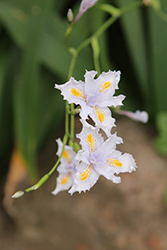It's all about ...
plants

Plant Height: 12 inches
Flower Height: 18 inches
Spacing: 14 inches
Sunlight:
![]()
Hardiness Zone: 8a
Other Names: Japanese Roof Iris, Butterfly Flower
Description:
An attractive iris, featuring delicate looking late spring flowers of pale lavender to white with purple and gold markings, over an upright fan of green foliage; a remarkable addition to the shade garden
Ornamental Features
Fringed Iris features delicate lavender flag-like flowers with white overtones, gold throats and purple spots at the ends of the stems from late spring to early summer. The flowers are excellent for cutting. Its attractive sword-like leaves remain grayish green in colour throughout the season.
Landscape Attributes
Fringed Iris is an herbaceous perennial with tall flower stalks held atop a low mound of foliage. Its medium texture blends into the garden, but can always be balanced by a couple of finer or coarser plants for an effective composition.
This plant will require occasional maintenance and upkeep, and should be cut back in late fall in preparation for winter. Deer don't particularly care for this plant and will usually leave it alone in favor of tastier treats. Gardeners should be aware of the following characteristic(s) that may warrant special consideration;
- Insects
Fringed Iris is recommended for the following landscape applications;
- Mass Planting
- Border Edging
- General Garden Use
- Naturalizing And Woodland Gardens
- Container Planting
Planting & Growing
Fringed Iris will grow to be about 12 inches tall at maturity extending to 18 inches tall with the flowers, with a spread of 24 inches. When grown in masses or used as a bedding plant, individual plants should be spaced approximately 14 inches apart. The flower stalks can be weak and so it may require staking in exposed sites or excessively rich soils. It grows at a medium rate, and under ideal conditions can be expected to live for approximately 10 years. As an herbaceous perennial, this plant will usually die back to the crown each winter, and will regrow from the base each spring. Be careful not to disturb the crown in late winter when it may not be readily seen!
This plant should be grown in a location with partial shade or which is shaded from the hot afternoon sun. It prefers to grow in average to moist conditions, and shouldn't be allowed to dry out. It is not particular as to soil pH, but grows best in rich soils. It is somewhat tolerant of urban pollution, and will benefit from being planted in a relatively sheltered location. Consider applying a thick mulch around the root zone in winter to protect it in exposed locations or colder microclimates. This species is not originally from North America. It can be propagated by division.
Fringed Iris is a fine choice for the garden, but it is also a good selection for planting in outdoor pots and containers. It is often used as a 'filler' in the 'spiller-thriller-filler' container combination, providing a mass of flowers and foliage against which the larger thriller plants stand out. Note that when growing plants in outdoor containers and baskets, they may require more frequent waterings than they would in the yard or garden. Be aware that in our climate, most plants cannot be expected to survive the winter if left in containers outdoors, and this plant is no exception. Contact our experts for more information on how to protect it over the winter months.
This plant is not reliably hardy in our region, and certain restrictions may apply; contact the store for more information.
